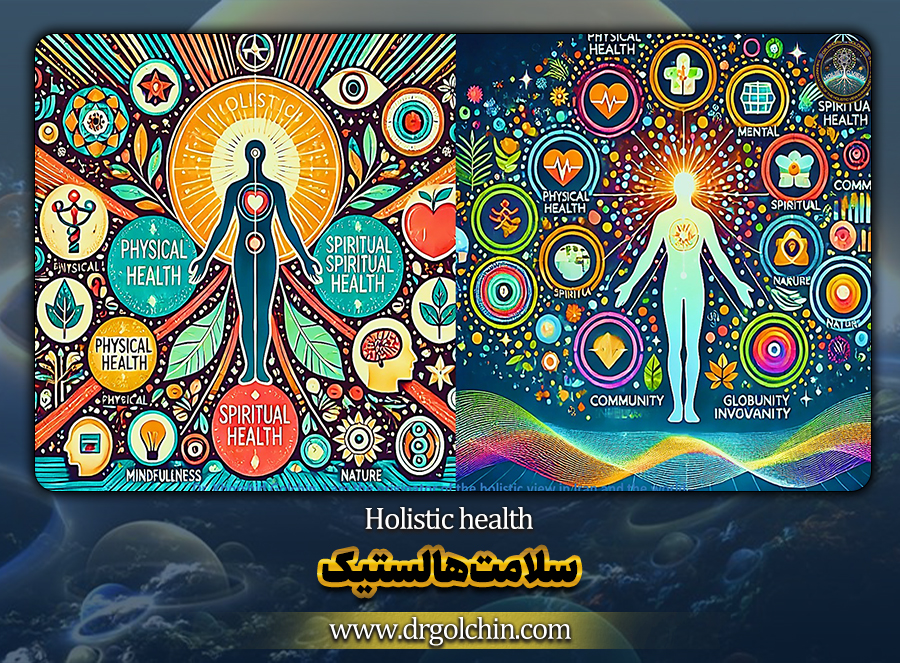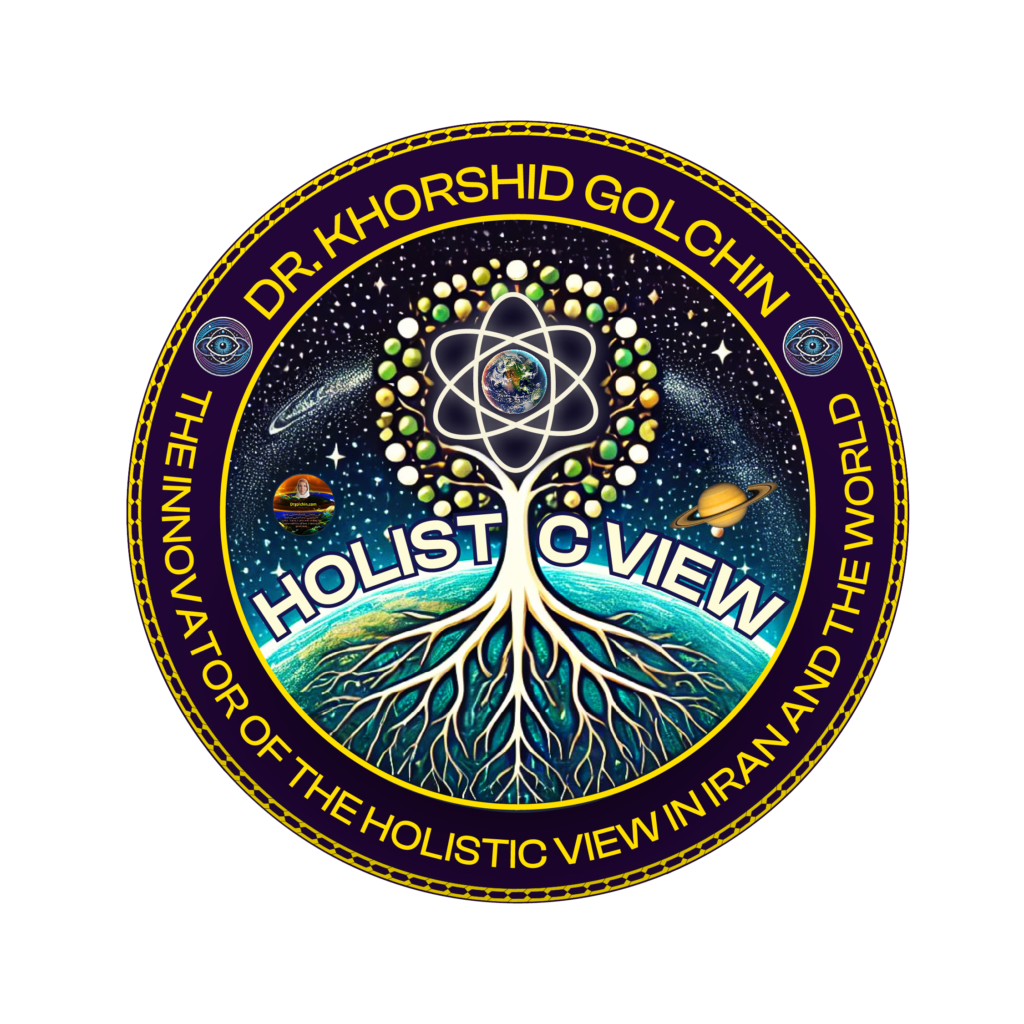سلامت هالستیک

سلامت هالستیک (Holistic Health) به عنوان رویکردی جامع و یکپارچه در حوزه سلامت شناخته میشود که به جای تمرکز بر درمان بیماریهای فردی، به بهبود و تعادل کل سیستم بدن و ذهن انسان میپردازد. این رویکرد بر این اصل استوار است که همه ابعاد زندگی انسان به هم پیوسته و مرتبط هستند و برای دستیابی به سلامت کامل، باید به تمام این جنبهها توجه کرد. در این مقاله از وبسایت آکادمی هالستیک ویو به بررسی ابعاد مختلف سلامت هالستیک، شامل سلامت روحی، روانی، جسمی، اجتماعی، اقتصادی، فرهنگی، احساسی و ارتباطی خواهیم پرداخت.
فهرست عناوین
سلامت روحی در سلامت هالستیک
سلامت روحی به معنای احساس تعادل و ارتباط با خود و جهان پیرامون است. این نوع از سلامت به باورها، ارزشها، و اعتقادات فردی مربوط میشود و تأثیر مستقیمی بر سایر جنبههای سلامت دارد. افرادی که دارای سلامت روحی قوی هستند، احساس معنا و هدف در زندگی دارند و قادر به مواجهه با چالشهای زندگی با ذهنی آرام و متعادل هستند. مراقبه، نماز، مدیتیشن و شرکت در فعالیتهای مذهبی یا معنوی میتواند به بهبود سلامت روحی کمک کند.
سلامت روانی
سلامت روانی به وضعیت روانی و عاطفی فرد اشاره دارد و شامل توانایی مدیریت استرس، احساسات، و روابط با دیگران است. افراد با سلامت روانی قوی، قادر به مقابله با استرسها و فشارهای زندگی هستند و از اعتماد به نفس و عزت نفس بالایی برخوردارند. مشاوره روانشناسی، رواندرمانی، و تکنیکهای مدیریت استرس مانند یوگا و مدیتیشن میتوانند به بهبود سلامت روانی کمک کنند.
سلامت جسمی در سلامت هالستیک
سلامت جسمی به وضعیت بدنی و توانایی انجام فعالیتهای روزانه بدون خستگی یا درد اشاره دارد. این نوع از سلامت شامل تغذیه مناسب، ورزش منظم، خواب کافی و پیشگیری از بیماریها میشود. افراد با سلامت جسمی قوی، انرژی و توانایی بیشتری برای انجام فعالیتهای روزمره و لذت بردن از زندگی دارند. رعایت یک رژیم غذایی متعادل، ورزش منظم و مراقبتهای پزشکی دورهای میتواند به حفظ و بهبود سلامت جسمی کمک کند.
سلامت اجتماعی
سلامت اجتماعی به کیفیت روابط و تعاملات فرد با دیگران اشاره دارد. این نوع از سلامت شامل داشتن روابط حمایتی و معنادار با خانواده، دوستان، و جامعه است. افراد با سلامت اجتماعی قوی، قادر به برقراری ارتباط موثر و سازنده با دیگران هستند و از حمایت اجتماعی مناسبی برخوردارند. شرکت در فعالیتهای اجتماعی، گروههای حمایتی و فعالیتهای داوطلبانه میتواند به بهبود سلامت اجتماعی کمک کند.
سلامت اقتصادی در سلامت هالستیک
سلامت اقتصادی به وضعیت مالی و توانایی مدیریت منابع مالی اشاره دارد. این نوع از سلامت شامل داشتن درآمد کافی برای تأمین نیازهای اساسی، مدیریت بدهیها و پسانداز برای آینده است. افراد با سلامت اقتصادی قوی، کمتر دچار استرسهای مالی میشوند و قادر به برنامهریزی مالی مناسب هستند. آموزشهای مالی، برنامهریزی بودجه و مشاورههای مالی میتواند به بهبود سلامت اقتصادی کمک کند.
سلامت فرهنگی
سلامت فرهنگی به احساس تعلق به فرهنگ و هویت فردی اشاره دارد. این نوع از سلامت شامل احترام به تنوع فرهنگی، پذیرش تفاوتها و تعامل مثبت با فرهنگهای مختلف است. افراد با سلامت فرهنگی قوی، دارای درک عمیقتری از هویت و تاریخ خود هستند و قادر به برقراری روابط مثبت با دیگر فرهنگها هستند. شرکت در فعالیتهای فرهنگی، مطالعه تاریخ و فرهنگهای مختلف و تعامل با افراد از فرهنگهای گوناگون میتواند به بهبود سلامت فرهنگی کمک کند.
سلامت احساسی
سلامت احساسی به توانایی مدیریت و بیان احساسات به شیوهای سالم و مناسب اشاره دارد. این نوع از سلامت شامل شناخت و پذیرش احساسات، توانایی ابراز آنها و برخورداری از حمایتهای عاطفی است. افراد با سلامت احساسی قوی، قادر به برقراری روابط عاطفی مثبت و سازنده هستند و میتوانند با چالشهای احساسی به خوبی مواجه شوند. تمرینهای خودآگاهی، مشاورههای روانشناسی و شرکت در گروههای حمایتی میتواند به بهبود سلامت احساسی کمک کند.
سلامت ارتباطی در سلامت هالستیک
سلامت ارتباطی به کیفیت و اثربخشی ارتباطات فرد با دیگران اشاره دارد. این نوع از سلامت شامل توانایی برقراری ارتباطات مثبت و موثر، حل تعارضات و حفظ روابط صمیمانه و سازنده است. افراد با سلامت ارتباطی قوی، قادر به برقراری ارتباطات موثر با خانواده، دوستان و همکاران هستند و میتوانند در محیطهای مختلف به خوبی تعامل کنند. آموزش مهارتهای ارتباطی، تمرینهای ارتباطی و مشاورههای خانوادگی میتواند به بهبود سلامت ارتباطی کمک کند.
Holistic health is recognized as an integrated and comprehensive approach to health, focusing on enhancing and balancing the entire system of the body and mind rather than merely treating individual illnesses. This approach is founded on the principle that all aspects of human life are interconnected and interrelated. To achieve complete health, attention must be paid to all these dimensions. This article explores the various aspects of holistic health, including physical, mental, emotional, social, economic, cultural, and relational well-being.
Spiritual Health
Spiritual health refers to the sense of balance and connection with oneself and the surrounding world. This aspect of health pertains to individual beliefs, values, and faith and has a direct impact on other health dimensions. People with strong spiritual health find meaning and purpose in life and can face life’s challenges with a calm and balanced mind. Practices like meditation, prayer, mindfulness, and participation in religious or spiritual activities can enhance spiritual health.
Mental Health
Mental health refers to an individual’s psychological and emotional state, including the ability to manage stress, emotions, and relationships. Individuals with strong mental health can cope with life’s stresses and pressures and possess high self-esteem and confidence. Psychological counseling, psychotherapy, and stress management techniques like yoga and meditation can improve mental health.
Physical Health
Physical health pertains to the state of the body and the ability to perform daily activities without fatigue or pain. This dimension includes proper nutrition, regular exercise, adequate sleep, and disease prevention. Individuals with strong physical health have more energy and capability to engage in daily activities and enjoy life. Maintaining a balanced diet, regular physical activity, and periodic medical check-ups can help preserve and enhance physical health.
Social Health
Social health relates to the quality of an individual’s relationships and interactions with others. This dimension includes having supportive and meaningful relationships with family, friends, and the community. Individuals with strong social health can establish effective and constructive communication with others and receive adequate social support. Participating in social activities, support groups, and volunteer work can improve social health.
Economic Health
Economic health refers to the financial status and the ability to manage financial resources. This dimension includes having sufficient income to meet basic needs, managing debts, and saving for the future. Individuals with strong economic health experience less financial stress and can plan their finances effectively. Financial education, budgeting, and financial counseling can help improve economic health.
Cultural Health
Cultural health involves a sense of belonging to one’s culture and identity. This dimension includes respecting cultural diversity, accepting differences, and interacting positively with various cultures. Individuals with strong cultural health have a deeper understanding of their identity and history and can establish positive relationships with other cultures. Engaging in cultural activities, studying history and different cultures, and interacting with people from diverse backgrounds can enhance cultural health.
Emotional Health
Emotional health refers to the ability to manage and express emotions in a healthy and appropriate way. This dimension includes recognizing and accepting emotions, being able to express them, and having emotional support. Individuals with strong emotional health can build positive and constructive emotional relationships and effectively face emotional challenges. Self-awareness practices, psychological counseling, and participating in support groups can improve emotional health.
Relational Health
Relational health pertains to the quality and effectiveness of an individual’s interactions with others. This dimension includes the ability to establish positive and effective communications, resolve conflicts, and maintain intimate and constructive relationships. Individuals with strong relational health can communicate effectively with family, friends, and colleagues and interact well in various environments. Communication skills training, relational practices, and family counseling can enhance relational health.
Conclusion
Holistic health is an integrated and comprehensive approach to health that considers all aspects of human life. This approach emphasizes that to achieve complete health, attention must be given to all dimensions of life, including spiritual, mental, physical, social, economic, cultural, emotional, and relational health. By focusing on balance and harmony among these aspects, one can improve the quality of life and increase satisfaction and happiness.
Ultimately, holistic health reminds us that everything in life is interconnected and interrelated. To achieve complete health, we must consider all aspects of life. This perspective can serve as a valuable guide in our lives, leading us to a better and deeper understanding of health and happiness.
دکتر خورشید گلچین
مبتکر دیدگاه هالستیک در ایران و جهان
Dr. Khorshid Golchin,
the innovator of the holistic view in Iran and the world
